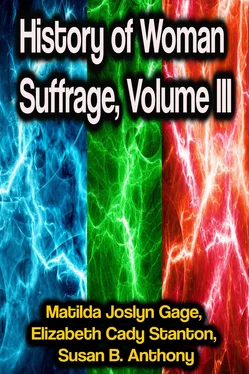A distinguished American statesman remarked that the war of the rebellion was waged "to expound the constitution." It is a pertinent question now, shall all other contradictory principles be retained in the constitution until they, too, are expounded by civil war? On what theory is it less dangerous to defraud twenty million women of their inalienable rights than four million negroes? Is not the same principle involved in both cases? We ask congress to pass a sixteenth amendment, not only for woman's protection, but for the safety of the nation. Our people are filled with unrest to-day because there is no fair understanding of the basis of individual rights, nor the legitimate power of the national government. The Republican party took the ground during the war that congress had the right to establish a national currency in every State; that it had the right to emancipate and enfranchise the slaves; to change their political status in one-half the States of the union; to pass a civil rights bill, securing to the freedman a place in the schools, colleges, trades, professions, hotels, and all public conveyances for travel. And they maintained their right to do all these as the best measures for peace, though compelled by war.
And now, when congress is asked to extend the same protection to the women of the nation, we are told they have not the power, and we are remanded to the States. They say the emancipation of the slave was a war measure, a military necessity; that his enfranchisement was a political necessity. We might with propriety ask if the present condition of the nation, with its political outlook, its election frauds daily reported, the corrupt action of men in official position, governors, judges, and boards of canvassers, has not brought us to a moral necessity where some new element is needed in government. But, alas! when women appeal to congress for the protection of their natural rights of person and property, they send us for redress to the courts, and the courts remand us to the States. You did not trust the Southern freedman to the arbitrary will of courts and States! Why send your mothers, wives and daughters to the unwashed, unlettered, unthinking masses that carry popular elections?
We are told by one class of philosophers that the growing tendency to increase national power and authority is leading to a dangerous centralization; that the safety of the republic rests in local self-government. Says the editor of the Boston Index :
What is local self-government? Briefly, that without any interference from without, every citizen should manage his own personal affairs in his own way, according to his own pleasure; that every town should manage its own town affairs in the same manner and under the same restriction; every county its own county affairs, every State its own State affairs. But the independent exercise of this autonomy, by personal and corporate individuals, has one fundamental condition, viz.: the maintenance of all these individualities intact, each in its own sphere of action, with its rights uninfringed and its freedom uncurtailed in that sphere, yet each also preserving its just relation to all the rest in an all comprehensive social organization. Every citizen would thus stand, as it were, in the center of several concentric and enlarging circles of relationship to his kind; he would have duties and rights in each relation, not only as an individual but also as a member of town, county, State and national organization. His local self-government will be at his highest possible point of realization, when in each of these relations his individual duties are discharged and his rights maintained.
On the other hand, what is centralization?
It is such a disorganization of this well-balanced, harmonious and natural system as shall result in the absorption of all substantial power by a central authority, to the destruction of the autonomy of the various individualities above mentioned; such as was produced, for instance, when the municipia of the Roman empire lost their corporate independence and melted into the vast imperial despotism which prepared the way for the collapse of society under the blows of Northern barbarism. Such a centralization must inevitably be produced by decay of that stubborn stickling for rights, out of which local self-government has always grown. That is, if individual rights in the citizen, the town, the county, the State, shall not be vindicated as beyond all price, and defended with the utmost jealousy, at whatever cost, the spirit of liberty must have already died out, and the dreary process of centralization be already far advanced. It will thus be evident that the preservation of individual rights is the only possible preventative of centralization, and that free society has no interest to be compared for an instant in importance with that of preserving these individual rights. No nation is free in which this is not the paramount concern. Woe to America when her sons and her daughters begin to sneer at rights! Just so long as the citizens are protected individually in their rights, the towns and counties and States cannot be stripped; but if the former lose all love for their own liberties as equal units of society, the latter will become the empty shells of creatures long perished. The nation as such, therefore, if it would be itself free and non-centralized, must find its own supreme interest in the protection of its individual citizens in the fullest possible enjoyment of their equal rights and liberties.
As this question of woman's enfranchisement is one of national safety, we ask you to remember that we are citizens of the United States, and, as such, claim the protection of the national flag in the exercise of our national rights, in every latitude and longitude, on sea, land, at home as well as abroad; against the tyranny of States, as well as against foreign aggressions. Local authorities may regulate the exercise of these rights; they may settle all minor questions of property, but the inalienable personal rights of citizenship should be declared by the constitution, interpreted by the Supreme Court, protected by congress and enforced by the arm of the executive. It is nonsense to talk of State rights until the graver question of personal liberties is first understood and adjusted. President Hayes, in reply to an address of welcome at Charlottesville, Va., September 25, 1877, said:
Equality under the laws for all citizens is the corner-stone of the structure of the restored harmony from which the ancient friendship is to rise. In this pathway I am going, the pathway where your illustrious men led—your Jefferson, your Madison, your Monroe, your Washington.
If, in this statement, President Hayes is thoroughly sincere, then he will not hesitate to approve emphatically the principle of national protection for national citizens. He will see that the protection of all the national citizens in all their rights, civil, political, and religious—not by the muskets of United States troops, but by the peaceable authority of United States courts—is not a principle that applies to a single section of the country, but to all sections alike; he will see that the incorporation of such a principle in the constitution cannot be regarded as a measure of force imposed upon the vanquished, since it would be law alike to the vanquished and the victor. In short, he will see that there is no other sufficient guarantee of that equality of all citizens, which he well declares to be the "corner-stone of the structure of restored harmony." The Boston Journal of July 19, said:
There are cases where it seems as if the constitution should empower the federal government to step in and protect the citizen in the State, when the local authorities are in league with the assassins; but, as it now reads, no such provision exists.
That the constitution does not make such provision is not the fault of the president; it must be attributed to the leading Republicans who had it in their power once to change the constitution so as to give the most ample powers to the general government. When Attorney-General Devens was charged last May with negligence in not prosecuting the parties accused of the Mountain Meadow massacre, his defense was, that this horrible crime was not against the United States, but against the territory of Utah. Yet, it was a great company of industrious, honest, unoffending United States citizens who were foully and brutally murdered in cold blood. When Chief-Justice Waite gave his charge to the jury in the Ellentown conspiracy cases, at Charleston, S. C., June 1, 1877, he said:
Читать дальше












